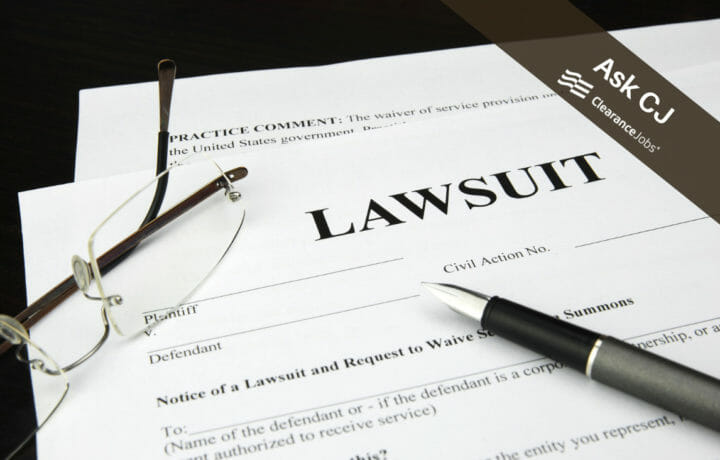“You’ve been served.” These are the famous words in pop culture for a process server, or a civil (non-criminal) case usually involving a legal dispute between two or more parties. Section 28 of the SF-86 references this, and a subscriber to the ClearanceJobsBlog was curious about the class action lawsuits they were a part of:
I have been offered and have accepted a job with a DOE contractor, and the position requires a Level Q clearance. So, I’m in the process of filling out my first ever online SF-86, and I’m a bit stumped when it comes to “Section 29 – Public Record Civil Court Actions.”
I think that I may have participated as a “plaintiff” in a couple of class action lawsuits over the past ten years, but I honestly have no clue as to what they might have been for, nor do I give any details about them. Should I bother listing anything since I truly have no info (other than a hunch)?
I have otherwise never been involved as either a plaintiff or dependent in any sort of Civil Court Action. However, I was appointed by a Surrogate’s Court as an administrator for the estates of my mother and my father. In addition, my mother’s estate has an active financial claim/lien levied against it for an unpaid nursing home bill (the estate remains open pending the eventual outcome of a wrongful death settlement). As an administrator, I am not liable of course for any estate debts. In any event, should I bother listing any of this on the SF-86, or would doing so just raise more questions and not even be applicable in the first place?
CLEARANCE HOLDERS AND LAWSUITS
Section 28 of the SF-86 asks: “In the last ten (10) years, have you been a party to any public record civil court action not listed elsewhere on this form?” It requires applicants to list the date, court name, details of the nature of the lawsuit, parties involved, and the result. Marko Hakamaa notes, “If you did not initiate the class action lawsuit, were not singled out and named, but rather were just a part of the particular group for whom the action was filed then you do not have to list it.”
For the other court action involving the estate lien, the applicant should list it even though they were not a plaintiff/dependent; section 28 asks if you were ‘any’ party. Background investigators do review court filings, so it’s best to be forthcoming. Class action lawsuits are one thing, but a pattern of lawsuits is another. If you’ve been involved as a direct party in multiple legal actions, that may be seen as an issue for your security clearance application. But it’s always better to disclose than try to hide any court involvement – it will come up in the background investigation.
Much about the clearance process resembles the Pirate’s Code: “more what you’d call guidelines than actual rules.” This case-by-case system is meant to consider the whole person, increase process security, and allow the lowest-risk/highest-need candidates to complete the process. However, it also creates a lot of questions for applicants. For this reason, we maintain ClearanceJobsBlog.com – a forum where clearance seekers can ask the cleared community for advice on their specific security concerns. Ask CJ explores questions posed on the ClearanceJobs Blog forum, emails received, and comments from this site.




